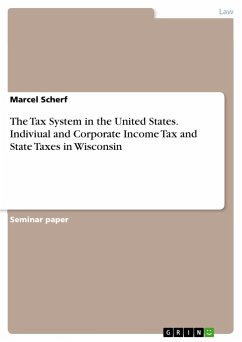Seminar paper from the year 2009 in the subject Law - Tax / Fiscal Law, grade: 2,3, Cologne University of Applied Sciences (Institut für Versicherungswesen), course: Internationales Steuerrecht, language: English, abstract: The English colonists in the Massachusetts Bay Colony enacted the first income tax in 1634, but the federal government did not adapt this form of taxation until 1861. Eleven states and the Federal Union raised income tax to finance the civil war. After the civil war, there was no need for income tax and the federal government to repeal the tax. All operations could be financed by customs duties.In 1894, a new federal income tax on individuals was enacted. The federal corporate income tax was enacted by the Congress in 1909. The U.S. Supreme Court had approved all these laws. The German Einkommensteuergesetz was enacted in 1934, the Körperschaftssteuergesetz was enacted in 1920, and the Gewerbesteuergesetz in 1936.With the Revenue Act from 1913, the first form 1040 was due on March 1, 1914. The structure was very similar. They already had deductions and personal exemptions. The rates ranged from 2 percent to 6 percent. The 6 percent rate applied for income in excess of $ 500,000. Nowadays the highest rate is 35 percent and applies on taxable income above $357,700.








